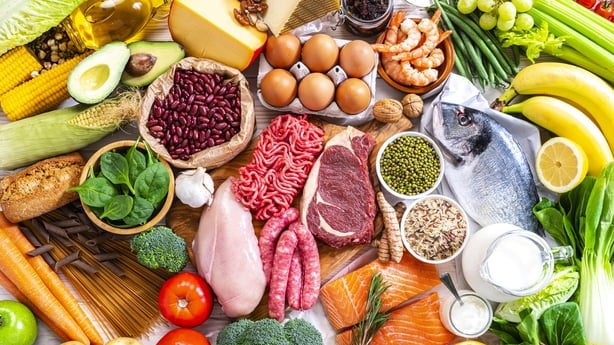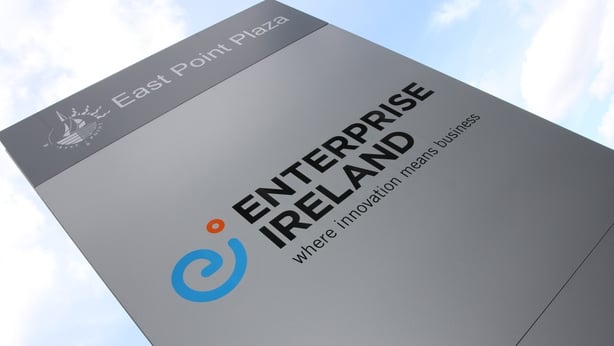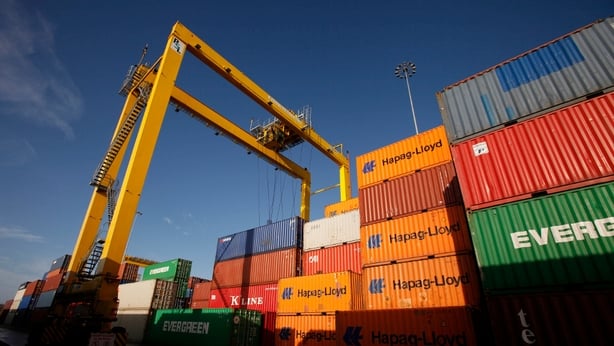The UK government has released its finalised set of rules to be imposed on Irish and EU exports as a result of Brexit.
The Border Target Operating Model, which sets out new customs and controls, was due to be introduced next month - but has been delayed for a fifth time.
It is now scheduled to come into effect on a phased basis from 31 January 2024.
Why have the checks been delayed?
Britain left the bloc's single market at the start of 2021 and while goods from Britain now face EU checks and paperwork demands, London has repeatedly delayed introducing checks on EU food and plant goods.
The UK government has previously cited the Covid-19 pandemic and the war in Ukraine as reasons for delaying the new checks.
Now, it fears that the extra bureaucracy for imported goods will fuel inflation which stood at nearly 7% in July.
"Its no secret that the UK is dealing with supply issues, with empty shelves in British supermarkets often featuring on social media," said Carol Lynch, Partner in the Customs and International Trade Services department at accounting, tax audit and business advisory firm BDO.
"Added to that, the UK is dealing with a stubborn inflation issue.
"The UK Government may have thought that the imposition of checks, particularly in the run up to Christmas would exacerbate both issues," she added.
She said these issues, coupled with the looming British General Election may have influenced the UK government's decision to kick the can down the road.
Is the delay good news for Irish companies?
A spokesperson for the Department of Foreign Affairs said the delay will give Irish exporters additional time to prepare for the new UK requirements.
"If businesses export goods from Ireland to the UK - excluding Northern Ireland, or across the UK landbridge, these new rules may require changes to their operations," the spokesperson said.
The Department of Foreign Affairs is encouraging all Irish exporters to examine their supply chains, speak to their customers in the UK and to their transport and logistics providers.
"The Government will continue to engage with Irish exporters to make sure they are ready for these new rules," the spokesperson said.
What are the main changes being introduced?

1. Import declarations
From 31 January 2024, Irish businesses exporting certain goods to Great Britain will need to pre-lodge their import declarations, and standard customs controls will apply on arrival.
This will apply to sanitary and phytosanitary (SPS) goods, excluding low risk plants and plant products.
Following Brexit, there has always been a requirement to file UK import declarations, however for movements from the island of Ireland, goods could move through UK ports without an import declaration being lodged in advance.
Instead you could lodge a supplementary declaration 175 days post arrival in the UK.
From 31 January, SPS goods from Ireland will now need to be pre-notified on the UK's SPS import system.
This requirement has already been in place for the import of goods from the rest of the European Union since the start of January last year.
"UK import declarations will need to be pre-lodged and notified using the Goods Vehicle Movement System (GVMS)", Revenue states on its website.
"Hauliers who move goods through UK ports which use the GVMS will need to register for the service.
"This will help to ensure that goods are processed through customs without delay."
2. Health certs
Ms Lynch of BDO said the most significant changes will apply to agri-food exporters.
At the moment, the majority of agri-food goods from Ireland enter the UK without the requirement for either health certs or Sanitary and Phytosanitary checks.
Currently, they are only required for the highest-risk live animals, germinal product and high risk plants.
But from 31 January 2024, export health certificates and phytosanitary certificates will apply to medium risk animal products, plant, and plant products imported to Great Britain from Ireland and the rest of the EU.
3. Physical checks
For EU countries excluding Ireland, documentary and risk-based identity and physical checks will apply for certain products from 30 April 2024.
For Ireland, these measures won't come into force for a further six months.
From the end of next October, documentary and risk-based identity and physical checks will apply to a number of products from Ireland at ports on the west coast of Great Britain.
These include medium-risk animal products, medium-risk plants, medium-risk plant products and high-risk food and feed of non animal origin.
We still don't know when physical checks for non-qualifying goods moving from the island of Ireland to Great Britain will begin. The date is expected to be confirmed this autumn.
4 Safety and Security (S&S) controls
Safety and security declarations for EU imports will come into force from 31 October 2024.
Ms Lynch of BDO said details have now been provided on the specific roles and responsibilities of both the carrier and the haulier when submitting S&S declarations.
"Each mode of transport will have certain requirements that must be followed to meet the Safety and Security requirements," Ms Lynch said.
"The Border Target Operating Model also introduces the UK Single Trade Window which will remove duplication where possible across different pre-arrival datasets – such as Safety and Security, Sanitary and Phytosanitary, and pre-lodged customs declarations," Ms Lynch explained.
What supports are in place for Irish businesses?

Bord Bia
Bord Bia is running a number of sector specific workshops this month, which will take into account the updated requirement for trading with the UK.
"The workshops will delve into each of these different sectors - from beef, to dairy and seafood and so on," said Marian O’Higgins, Bord Bia’s Head of Brexit response.
"This will be a great opportunity for each Irish company to take advantage of the support provided from Bord Bia," she said
The workshops will take place at a number of locations across the country:
- Dairy Workshop on 12 September: Anner Hotel, Tipperary
- Meat Workshop on 13 September: Killashee Hotel, Naas
- General Category Workshop on 13 Sept: Killashee Hotel, Naas
Registration details can be found online at bordbia.ie, or by emailing brexit@bordbia.ie.
Bord Bia also provides one-to-one supports for Irish producers and regular updates through webinars and e-magazines.
Despite the incoming administrative burden and the costs associated with that, Ms O'Higgins of Bord Bia said she is confident that the UK will remain the most important country for Irish food and drink exports.
"Last year alone, Irish exports to the UK were valued at approximately €5.4 billion.
"So given our close proximity and our history of trading, it is going to remain the most important market for Ireland across many of our key sectors from beef, dairy, horticulture, and all the way to prepared consumer food," she added.
Enterprise Ireland

Enterprise Ireland has a number of financial supports available under the Brexit Adjustment Initiative that will help companies prepare for the new exporting regime.
"Since the UK voted to leave the EU in 2016 we've worked closely with Irish businesses, the logistics sector and government departments and sister agencies to ensure that trade continues to flow smoothly," said Deirdre McPartlin, Enterprise Ireland Director for the UK, Nordics and Global Procurement.
Ms McPartlin said trade with the UK continues to grow, despite the changed trading relationship.
"Exports by Enterprise Ireland client companies to the UK were €7.6 billion in 2017 and rose to €9.2 billion last year," she pointed out.
"In partnership with our colleagues in the Revenue Commissioners, Bord Bia and other agencies we'll be using the experience and networks we’ve built since 2016 to ensure that all exporters are aware of the changes and are signposted to the advice they need," Ms McPartlin said.
The UK Government is also providing some support for Irish companies ahead of these changes coming into force.
The UK Department of Environment, Food and Rural Affairs is running a series of webinars later this month, with one on 21 September specifically about the impact on exports from Ireland.
Businesses can register for the free event online.
"In just 60 minutes, this online session will help traders who move goods from Ireland to Great Britain to understand the actions they need to take to prepare for these changes," the organisers said.
7 tips for Irish exporters from BDO Ireland

1. Engage with a clearance agent who is familiar with the new rules and is in a position to clear your goods into the UK on arrival.
2. If you export agri-food or plant products you need to categorise your products into low, medium and high risk and ensure you have the correct customs classification (HS code) applied.
3. Ensure you are registered in TracesNT to be able to issue health certs.
4. Discuss procedures with DAFM and your local VET in relation to how the forms will be signed off on for departure.
5. Discuss import procedures with your customers.
6. If you are operating a DDP model get advice on how to act as an importer into the UK under the new rules.
7. Build extra time into your supply chain to account for these new rules and review your pricing structure to ensure you have allowed for these additional cost.






